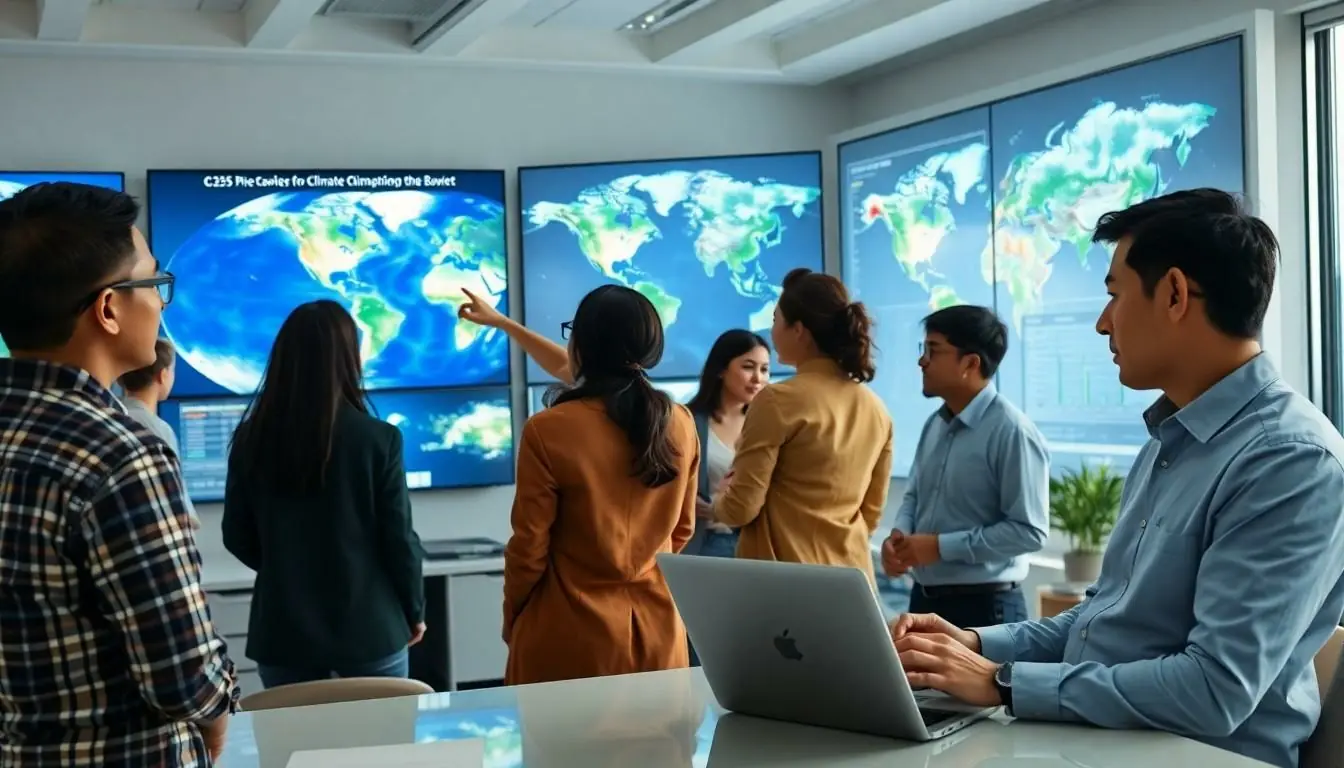In a world where the weather can’t seem to make up its mind, it’s no wonder some folks are scratching their heads over climate change. With temperatures rising and ice caps melting faster than ice cream on a summer day, one would think the evidence speaks for itself. Yet, a surprising number of people still shrug it off like a bad pun at a comedy club.
So why do some individuals choose to ignore the climate crisis? It’s not just a matter of stubbornness. Misinformation, political beliefs, and a sprinkle of good old-fashioned skepticism play a role. Understanding these reasons is crucial, as it might just help bridge the gap between those who see the urgent need for action and those who think it’s all just a hoax. Let’s dive into this perplexing phenomenon and uncover the layers behind the disbelief.
Table of Contents
ToggleUnderstanding Climate Change
Climate change refers to long-term shifts in temperatures and weather patterns. Scientific consensus supports that human activity, particularly fossil fuel combustion and deforestation, accelerates these changes. Increasing greenhouse gas emissions contribute significantly to global warming.
Rising global temperatures recorded across continents impact ecosystems and human societies. For instance, NASA reported the Earth’s average temperature has increased by about 1.2 degrees Celsius since the late 19th century. Melting glaciers and rising sea levels result from these temperature increases, leading to serious consequences for coastal communities.
Data indicates that 97% of climate scientists agree on human-induced climate change. Misinformation campaigns often undermine this consensus, leading to confusion among the public. Political beliefs play a significant role in shaping perceptions about climate change, as affiliations influence acceptance of scientific data.
Skepticism also springs from various sources, including vested interests in fossil fuel industries. Media portrayal can both clarify and distort the reality of climate change. Certain outlets amplify doubt, using selective data to challenge established scientific findings.
Recognizing the psychological factors at play fosters a better understanding of climate change denial. Cognitive dissonance may lead individuals to reject evidence that conflicts with their beliefs. Addressing these attitudes requires targeted communication strategies that resonate with specific audiences.
Ultimately, understanding the root causes of climate change denial helps facilitate productive discussions. Bridging the gap between believers and skeptics hinges on effective dissemination of accurate information. Engaging and educating the public remains crucial for advancing awareness and action against climate change.
The Psychology Behind Denial
Psychological factors play a significant role in climate change denial. Understanding them helps clarify why some individuals resist accepting scientific evidence.
Cognitive Dissonance
Cognitive dissonance occurs when individuals hold conflicting beliefs or attitudes. A person may care about the environment yet reject evidence of climate change, leading to discomfort. To relieve this discomfort, they might dismiss scientific facts or downplay the severity of the issue. This act of rationalizing behavior allows individuals to maintain their beliefs without confronting uncomfortable truths. Social pressures can also influence this phenomenon, as group identity often shapes personal beliefs. Adapting to these conflicting views proves challenging, fueling further denial.
Confirmation Bias
Confirmation bias leads individuals to favor information that aligns with their existing beliefs. When faced with differing viewpoints on climate change, some people seek out sources that support their skepticism. This selective exposure reinforces their preconceptions, making it harder to acknowledge scientific consensus. The prevalence of misinformation exacerbates this issue, as it provides readily accessible content that feeds denial. Individuals may prioritize personal experiences over scientific data, leading to skewed perceptions of climate change. Such biases can create a polarized atmosphere, hindering constructive dialogue on climate issues.
Social and Cultural Influences
Social and cultural factors significantly shape skepticism toward climate change. Understanding these influences provides insight into the prevalent climate denial among various communities.
Political Ideology
Political ideology plays a crucial role in shaping beliefs about climate change. Individuals aligned with conservative views often reject scientific consensus, perceiving climate change as a partisan issue. Many believe that acknowledging climate change necessitates government intervention, which contradicts their preference for limited state involvement. A study by Pew Research found that only 27% of conservative Republicans acknowledge human-caused climate change compared to 92% of liberal Democrats. This ideological divide creates an environment where beliefs about climate change become entrenched within broader political identities.
Misinformation and Media Influence
Misinformation coupled with media influence significantly clouds public understanding of climate change. Various media outlets present conflicting information, often amplifying doubts about scientific findings. Social media platforms further exacerbate the problem by allowing the rapid spread of false narratives that challenge established facts. Research shows that narratives doubting climate change often garner more attention and engagement than factual reporting. Consequently, individuals regularly encounter these misleading messages, shaping their beliefs and fostering skepticism in the face of overwhelming scientific evidence.
Economic Considerations
Economic factors significantly influence public perceptions of climate change. Individuals often weigh the implications for jobs and industry against the urgency of climate action.
Impact on Jobs and Industry
Job security drives skepticism about climate change. Many workers in fossil fuel industries fear losing their livelihoods due to a shift toward more sustainable energy sources. Transitioning to green jobs presents challenges such as retraining and potential income loss, leading some to resist climate initiatives. Additionally, businesses reliant on fossil fuels may perceive regulations as threats that could harm profits, further fostering doubt about climate science.
Financial Incentives
Financial motivations play a crucial role in climate change denial. The perceived cost of implementing climate solutions deters individuals and companies from embracing necessary change. Concerns about increased taxes or energy prices create resistance, especially when short-term economic benefits outweigh long-term environmental considerations. Surveys indicate that concerns about potential financial impacts often take precedence over acknowledging climate change’s risks, resulting in widespread skepticism and inaction.
The Role of Education
Education plays a crucial role in shaping perceptions of climate change. It influences how individuals understand and accept scientific information, impacting their viewpoints on the issue.
Knowledge Gaps
Knowledge gaps frequently exist in discussions about climate change. Many people lack basic understanding of scientific principles related to climate science. Research shows that individuals exposed to comprehensive climate education are more likely to recognize its significance. Additionally, without proper education, widespread misconceptions can persist, fueling skepticism. A study by the National Oceanic and Atmospheric Administration found that only 36% of Americans could name key contributors to climate change. Closing these gaps through effective curricula can foster a better grasp of climate dynamics.
Critical Thinking Skills
Critical thinking skills significantly enhance the ability to evaluate information. Individuals equipped with these skills can assess the validity of different claims about climate change. Studies indicate that higher education levels correlate with increased critical thinking abilities. Enhanced critical thinking allows for discerning credible sources from misinformation. Moreover, fostering these skills in educational settings can empower students to question misleading narratives. Encouraging skepticism of unverified information enhances engagement with scientific evidence, promoting informed discussions on climate issues.
Addressing climate change denial requires a multifaceted approach. Understanding the psychological and social factors at play can help bridge the gap between differing beliefs. By promoting accurate information and enhancing climate education, society can combat misinformation and foster critical thinking.
Engaging in open dialogue and creating inclusive platforms for discussion will encourage individuals to confront their biases. As awareness grows and education improves, the hope is that more people will recognize the urgency of climate action. The path forward hinges on collective efforts to unite around scientific consensus and prioritize the health of the planet for future generations.



